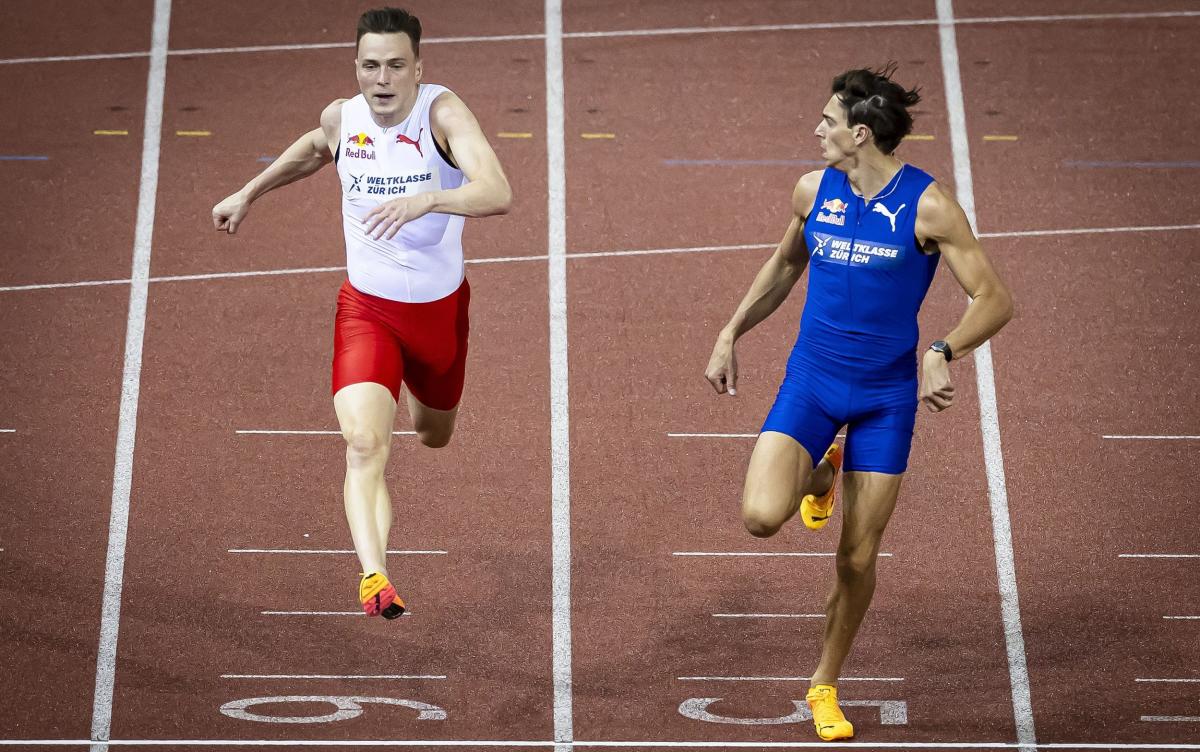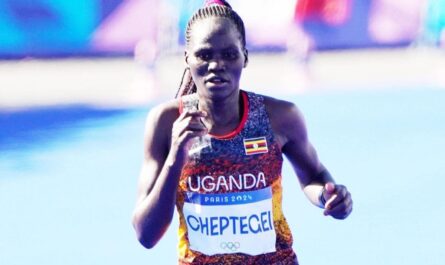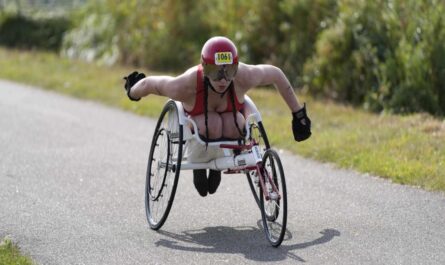
Double Olympic pole vault champion Armand Duplantis beat his good friend Karsten Warholm in a 100m exhibition sprint in Zurich on Wednesday, crossing the line in 10.37 seconds.
Duplantis, a Louisiana-born Swede known as “Mondo,” lined up against Norway’s Warholm, the 400m hurdles world record holder, in a duel on the eve of the city’s Diamond League meeting.
“I’m really motivated. How could I not be?” Duplantis said after running a time that was one second faster than the 9.79 seconds posted by the winner of this year’s Olympic 100m final. Warholm ran 10.47 seconds.
“I have to admit that Mondo is the best. He beat me fair and square today,” Warholm said. “It was a great race. He started really fast.”
Watch Mondo Duplantis 🇸🇪 beat Karsten Warholm 🇳🇴 in 100m head-to-head at the Diamond League in Zurich!!
He achieved a remarkable time of 10.37 s!
Following this defeat, Warholm will have to compete tomorrow in a Swedish jersey, according to Colin Jackson.pic.twitter.com/eqTzqgVAOb
— The Track and Field Gazette (@TrackGazette) September 4, 2024
The duo came up with the idea for the demonstration earlier in the season when they were debating who would be the fastest in the sprint. Their times aren’t fast enough to qualify to compete in the men’s 100m at the Olympics, but they’re good enough to beat all but the best male sprinters.
Duplantis, the world record holder in the pole vault, presented his friend with a Swedish racing vest that Warholm will now have to wear during his hurdles race on Thursday.


At a Diamond League meeting in Poland on August 25, Duplantis broke the pole vault world record for the third time this year, this time clearing 6.26m.
He also set a world record at the Paris Olympics, clearing 6.25m after winning the gold medal.
An enticing glimpse into the opportunities offered by social media that sport would be crazy not to seize


The action lasted less than 10.5 seconds, but the still-capacity crowd in Zurich’s 30,000-capacity Letzigrund Stadium told its own story.
And the numbers that could then be found on social media would have been even more likely to capture the attention of sports promoters: nearly two million views in 12 hours on X, similar numbers on TikTok and a live audience on YouTube of more than 100,000 people.
And for what purpose? A seemingly meaningless 100m race between Mondo Duplantis and Karsten Warholm, respectively world record holders in the pole vault and the 400m hurdles and two of the sport’s greatest personalities.
For the record, it was Duplantis who defied the odds by beating his track rival in 10.37 seconds, which drew more attention to his generational athleticism than most of his 10 pole vault world records. Just as Geoff Capes shocked a few people in the 1970s by beating Brendan Foster in a 200m sprint, it certainly served as a reminder of the broader and often underestimated talents of eventers.


The event, a prelude to Thursday night’s more traditional Diamond League programme, also provided an enticing glimpse of the opportunities athletics would be foolish not to seize today.
Boxers, even those at a much more limited level, were the first to really recognize the possibilities offered by social media to organize lucrative and popular events outside the traditional parameters of their sport.
With individual entries more akin to a heavyweight bout, Warholm and Duplantis certainly tapped into that theme, but the broader triumph of Wednesday’s Red Bull-sponsored event was to illustrate that athletics actually has a unique potential to do this even more convincingly. For there is an almost infinite range of possibilities in the expanse that running, throwing and jumping can offer, and unlike social media boxing stars, athletics can actually showcase genuine sporting champions.
It’s about introducing a little fun and innovation
And what about Noah Lyles taking on Matthew Hudson-Smith in the 300m? Or Sydney McLaughlin-Levrone in the 200m or the long jump, where she would also be fearsomely good. There has also been talk for a long time of Warholm himself taking on his compatriot Jakob Ingebrigtsen in the 600m.
For a sport that struggles so much to maintain the visibility it deserves outside of the Olympics or the World Championships, these kinds of low-pressure events don’t have to encroach on the serious, defining activities of the major championships. They’re simply a fantastic way to capture the interest and imagination of a wider fan base outside of the sport while showcasing the talent and personality of its global stars in a different way.
It’s not about breaking traditions. It’s about introducing a bit of fun and innovation as an additional gateway to the general public. These kinds of special confrontations shouldn’t be overrated, but can be a great start to any Diamond League night.
As in many sports, the general context is one of constant debate and power struggle over the best range of competitions. Athletics is actually closer to a sport like boxing than, say, football, because of the pace of many of its main players and its realistic ability to compete at an optimal level only five to ten times a year.
But that doesn’t have to be a major drawback. The calendar simply needs to reflect that better, and that’s why, in addition to the money at stake, Michael Johnson’s Grand Slam Track League, with its four annual dates, has a solid starting structure from which a coherent annual competition can emerge. The Diamond League, which runs over 15 different dates, reaches more places but never manages to attract the best at each event.
But, as Duplantis and Warholm have shown, almost any event could be improved by thinking outside the box and more people will also be watching the purists’ Diamond League racing programme in Zurich thanks to Wednesday’s kick-off.


